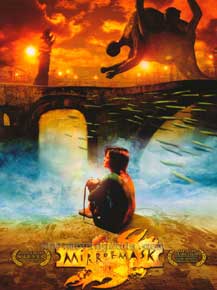 Author Neil Gaiman joins forces with the Jim Henson muppet workshop for the visually imaginative fantasy MirrorMask (2005).
Author Neil Gaiman joins forces with the Jim Henson muppet workshop for the visually imaginative fantasy MirrorMask (2005).
The dvd, surprisingly for a kiddy flick, comes with a Parental Guidance rating. The graphics, though not the story, are fairly sophisticated, & perhaps the censors thought it a bit scary here & there for littler or neurotic children. Mainly the rating is surprising, because this is kidstuff through & through, without much to engage adults.
It opens with the Campbell Family Circus in full action. The Cirque du Soleil influence on the design is a mite too strong to call any of it original; still, if this circus really existed, it'd be a good one.
Teenager Helena Campbell (Stephanie Leonidas) won't come out of her trailer. She's having a kid-fit & doesn't want to do her bit in the show. She's feeling like a freak & wishes she could run away from the circus & join the real world.
"You're going to be the death of me!" says her circus-costumed mommy Joanna (Gina McKee).
"I wish I were!" says Helena fatefully.
Mom soon collapses in the circus ring. She's carted off to the hospital & the first cancer operation is not enough to save her. Helena is sent to stay with her senile aunty Nan, & the fate of the circus is in question as the performers argue whether to stick around & see if Joanne recovers, if they should abandon her to take the circus on to Scotland, or if everyone should try to find other work.
Helena goes to bed one night & without preamble abruptly dreams herself into an alternate universe. This is a spooky three-dimension cartoon version of the many drawings Helena had been making & pinning to the wall of her bedroom in Nan's house. Slowly she realizes it's not just a dream, but she has literally traded places with her otherworld self, the deplorable anti-Helena, who may indeed be the death of Helena's mother.
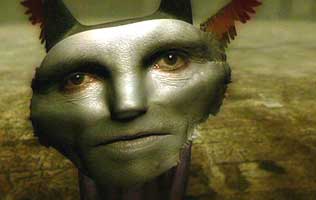 Now & then she can look out from one or another window of the drawings pinned to the wall & see what her Dark Half is up to in the real world: arguing with daddy (Rob Brydon), dressing like a Goth girl, snogging boys, smoking, & periodically grabbing pictures off the wall, crumbling them up, & setting them on fire. Now & then she can look out from one or another window of the drawings pinned to the wall & see what her Dark Half is up to in the real world: arguing with daddy (Rob Brydon), dressing like a Goth girl, snogging boys, smoking, & periodically grabbing pictures off the wall, crumbling them up, & setting them on fire.
By this we know that being a typical teenager is the epitome of evil. The otherworld is being destroyed section by section, taken over by the Dark, as the Anti-Helena destroys the real Helena's artworks.
Helena finds the beautiful White Queen (her mom) perpetually sleeping at the heart of the vanishing world. The expanding dark world is ruled by the Dark Queen (anti-mom).
In order to restore the Balance, & so that Helena's mom will survive her second cancer operation & get well, Helena has to find the MirrorMask & use it to return herself to the real world & get her Goth other-self back in the dream-realm where she belongs.
It's a foregone conclusion that in a kiddy film like this, the happy ending will be achieved, though if you think about it too much, the rebellious "anti" Helena who gets tossed back into the dreadful dream-world was a real person too. This comes dangerously close to a message of discarding unruly children because only tractable children qualify for freedom or life. But let's not look too deeply at such badly written fiction, as the faults are usually due to their ill thought out vacuity rather than any actual message or agenda.
For any but the youngest viewers it has no suspense since the ending is never in question. It has to be appreciated for the decorative elements, the sets & CGI animation Helena interacts with in her Alice in Wonderland/Dorothy in Oz environment.
With visual references to Bosch, Edward Gorey, Dali, & so on, it's sometimes quite a lovely romp through a surrealist environment. Sphynxes abound, freaky rainbow-winged kitty-cats with nearly human faces who eat books instead of mice are easily befuddled by pathetically unclever riddles.
There are floating giants who speak really really slowly, so getting information out of them in an emergency provides a dreamlike frustration of a muppet moment. There are fish everywhere swimming about through the air (because Helena had doodled fish throughout her drawings).
Most everyone in this world wears masks & they find real faces (like Helena's) squishy & malleable & strange. The Dark Queen kidnaps Helena & forces her to be her daughter, but Helena's masked chum Valentine (Jason Barry) pulls her back to the light so she can get the mirrormask & restore the balance.
I found MirrorMask a tediously cartoony disappointment, though viewers totally new to pictorial oddity may find the visuals fascinating enough to not mind a meritless story. It's certainly nowhere near the equal of Neil Gaiman's startling Neverwhere (1996), & anyone whose seen the best works of the Brothers Quay knows that MirrorMask is just not in that high an arena of art.
 Given the greater quality of Gaiman's Neverwhere it's tempting to suppose the comparative stinkiness of MirrorMask is not his fault but the fault of the Jim Henson workshop. I was reminded of the similarly disappointing Labyrinth (1986) directed by Jim Henson himself, which was likewise about a teenager who goes into a muppety Otherworld. Given the greater quality of Gaiman's Neverwhere it's tempting to suppose the comparative stinkiness of MirrorMask is not his fault but the fault of the Jim Henson workshop. I was reminded of the similarly disappointing Labyrinth (1986) directed by Jim Henson himself, which was likewise about a teenager who goes into a muppety Otherworld.
Sarah (Jennifer Connelly) is getting tired of her baby brother Toby (Toby Froud, son of goblin designers Brian & Wendy Froud). Goblins lurk just beyond the shadows unable to get into our world unless the right words are said. And when Sarah wishes the fairies would cart away Toby, those are the right words all righty.
Regretting that a momentary feeling of hostility has had such terrible repercussions, Sarah has to go into the fairy world seeking the Goblin King (David Bowie in perhaps his worst & certainly most laughable role). It takes thirteen hours to transform a stolen child into a goblin, & that's how long Sarah has to get Toby back.
There are moments I got a kick out of like when the talking caterpillar gave bad directions. But in the main the puppetry was too cute to be scary & too dumb to be cute. Worse, Bowie singing astonishingly bad pop tunes written for the occasion, & walking under over & about Escher staircases, should never have lasted longer than a 45-second Sesame Street cartoon called "Up" & "Down."
I can't believe anyone responsible for this miserable excuse for a fairy tale actually mistook Bowie's musical bits as even close to adequate. I can only imagine everyone was too scared of him to tell him to go home & try to write some better stuff. Or they paid him in advance & the contract said that if they didn't like what he delivered they'd have to pay an even bigger kill-fee, so they were stuck with some of the worst junk of Bowie's career.
And I say this not for any dislike of Bowie. I think he's absolutely splendid in Merry Christmas Mister Lawrence (1983) & several other performances. In Basquiat (1996) he turns up as the only actor ever to impersonate Andy Warhol correctly as bizarre but hugely appealing rather than just bizarre. And his theme song for Cat People (1982) plus stuff from his Ziggy Stardust period are excellent. It remains that as the Goblin King he's sucks, & the ditties he wrote for Labyrinth are an embarrassment.
A fear of actually startling preschoolers totally sabotages the show. As for content to hold adult attention too, there's more sophisticated stuff going on in Bert & Ernie routines.
For kiddies, though, it's likely just the thing. Getting angry at a baby brother, & setting out to save & protect him, is emotional content most smaller kids will relate to, especially if they actually have a baby brother. The child molestation theme of the Goblin King lusting for Sarah is too sublimated to worry the littler kids, & older kids will certainly know Bowie is acting like a sickening old lech & be glad Sarah gets away.
However, I read one mother's review in which she reported with delight that her preschool daughter fell in love with the Goblin King. If the romance of old leches teaches any children to take the candy from the perv lurking in the bushes, that'll be a dirty shame.
I know some adult viewers who regard this as a "cult classic" & watch it now & again without needing kids handy for an excuse. So clearly my feelings about it are nowhere near the universal norm. And if pressed to the wall, I'll admit that given the low quality of the majority of children's entertainment, Labyrinth goes in a higher category.
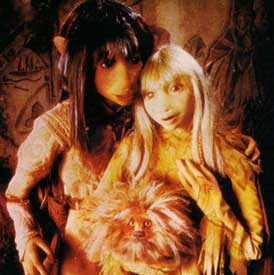 I'll admit further that Jennifer Connelly as Sarah does quite a remarkable job of seeming to believe various muppety characters are real. When cinematic fairy tales disappoint me personally, it's likely partly because I've read thousands & thousands of them from retold-for-children to collected-by-ethnologists, so I know too well how much better they should be. I'll admit further that Jennifer Connelly as Sarah does quite a remarkable job of seeming to believe various muppety characters are real. When cinematic fairy tales disappoint me personally, it's likely partly because I've read thousands & thousands of them from retold-for-children to collected-by-ethnologists, so I know too well how much better they should be.
To me The Dark Crystal (1982) is the greater achievement, co-directed by Jim Henson & Frank Oz. It's a tale of Order vs Chaos as a beautifully designed alien environment is threatened by destruction. As three suns converge, the full power of the Dark Crystal will be required to preserve the planet, but the crystal has been damaged.
The world is inhabited by opposing races. In the tradition of LotR, & unfortunately in the tradition of Christians vs Moslems, it is possible for one race to be absolutely evil & another race to be absolutely good. The lack of ambiguity keeps it simpleminded, but it somehow works even so.
The Skekses are the evil ones, bony mouldering & vulture-like, as different from Orks as the Henson workshop could make them, hoping we wouldn't notice they're Orks. If Chaos can come to predominate, they will be the rulers of disorder. The Urskeks by contrast are good & wise & hunched & tailed like ancient sorcerous monks or lizardy grampas. They've gotten a bit worn out as guardians of Order, however, & indeed it is an Urskek error that damaged the Dark Crystal.
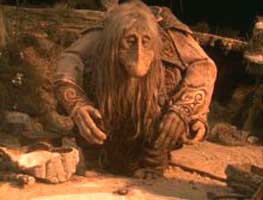 The world of Dark Crystal is populated by gorgeously designed creatures that transcend muppetiness, by turns sinister & awe inspiring. But not quite all the population of the film are well designed. Aughra the Keeper of the Secrets seems out of place, looking like he stepped out of a Dr. Seuse book. The world of Dark Crystal is populated by gorgeously designed creatures that transcend muppetiness, by turns sinister & awe inspiring. But not quite all the population of the film are well designed. Aughra the Keeper of the Secrets seems out of place, looking like he stepped out of a Dr. Seuse book.
And then there's the Gelflings, who're really just elves, noseless cutie-pritty-pixies who are close enough to children's dolls & nearly human that nobody watching this thing has to relate to characters that are legitimately otherworldly.
This is like creating a world full of wondrous fascinating beings, except starring Barbi & Ken. The Henson workshop did the same thing with Farscape; everyone's unique except the leading lady & leading man, who are a couple of dullard Jack & Jills (or John & Erin as the case might be).
Dark Crystal has some imperfections & justified detractors, but it strikes me as one of the most complex & serious films ever to star exclusively puppets. It transcends the expected muppetry. Just about everything but the Gelflings seem genuinely part of a different & very well realized world.
copyright © by Paghat the Ratgirl
|
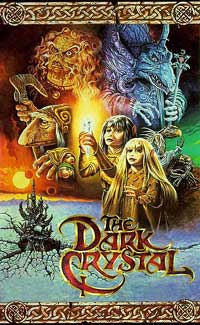

 Now & then she can look out from one or another window of the drawings pinned to the wall & see what her Dark Half is up to in the real world: arguing with daddy (Rob Brydon), dressing like a Goth girl, snogging boys, smoking, & periodically grabbing pictures off the wall, crumbling them up, & setting them on fire.
Now & then she can look out from one or another window of the drawings pinned to the wall & see what her Dark Half is up to in the real world: arguing with daddy (Rob Brydon), dressing like a Goth girl, snogging boys, smoking, & periodically grabbing pictures off the wall, crumbling them up, & setting them on fire.
 I'll admit further that Jennifer Connelly as Sarah does quite a remarkable job of seeming to believe various muppety characters are real. When cinematic fairy tales disappoint me personally, it's likely partly because I've read thousands & thousands of them from retold-for-children to collected-by-ethnologists, so I know too well how much better they should be.
I'll admit further that Jennifer Connelly as Sarah does quite a remarkable job of seeming to believe various muppety characters are real. When cinematic fairy tales disappoint me personally, it's likely partly because I've read thousands & thousands of them from retold-for-children to collected-by-ethnologists, so I know too well how much better they should be. The world of Dark Crystal is populated by gorgeously designed creatures that transcend muppetiness, by turns sinister & awe inspiring. But not quite all the population of the film are well designed. Aughra the Keeper of the Secrets seems out of place, looking like he stepped out of a Dr. Seuse book.
The world of Dark Crystal is populated by gorgeously designed creatures that transcend muppetiness, by turns sinister & awe inspiring. But not quite all the population of the film are well designed. Aughra the Keeper of the Secrets seems out of place, looking like he stepped out of a Dr. Seuse book.